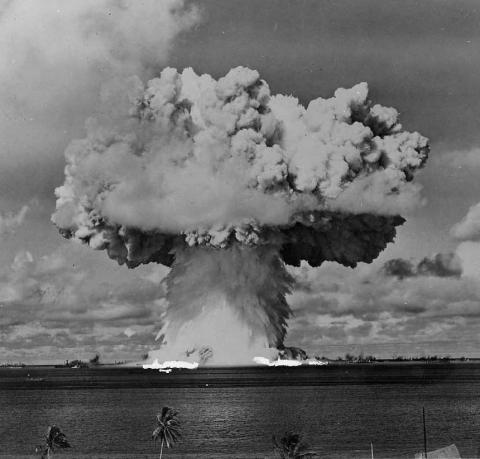The hydrogen bomb exploded at 6.45am, vaporising three islands in a fireball four-and-a-half miles wide and sending a tower of radioactive debris high into the atmosphere.
At 15 megatons, the Castle Bravo device – detonated on 01 March 1954 – was the most powerful nuclear weapon ever detonated by the United States, with a yield a thousand times greater than the bombs dropped on Hiroshima and Nagasaki.
The fallout from the test, and the 23 other nuclear weapons detonated in the Marshall Islands until the late 1950s, devastated the lives of the people who lived on Bikini Atoll, on the northern tip of the country. Hundreds of families had to leave when testing began in 1946, never to return because of the dangerous levels of radiation.
It was only in the 1980s that the U.S. government created two trust funds to compensate victims of its nuclear testing programme, with the payments scheme to help with health care, housing and living costs running like clockwork for decades.
But in January, the compensation suddenly stopped as it emerged that the funds had been drained of tens of millions of dollars.
“The government leaders have been telling everyone ‘We’ll pay next week’. But eight months later, here we are. Still no payments.”
In 2016, an audit showed there was US$71 million in the resettlement fund, and US$57.5 million in the Bikini claims fund. Today, the resettlement account has just US$100,036, according to the U.S. Department of the Interior. It is unclear how much money remains in the claims fund.
Now questions are being asked of two men: Anderson Jibas, the Mayor of the Kili-Bikini-Ejit (KBE) Local Government, and Gordon Benjamin, the KBE’s U.S.-based lawyer.
Despite the poverty on the Marshall Islands, in 2018 and 2019, Jibas and Benjamin went on a spending spree with money from the funds splashing out on lavish purchases worth millions of dollars ostensibly for the government.
They bought a large, twin-engined Dash-8 plane for US$3.25 million, ostensibly to help resupply the remote Pacific islands.
But it is now reportedly being kept in Taiwan, incurring storage fees of US$7,500 a month.
A pair of cargo ships were also bought, at a cost of US$1.2 million, also to aid in resupply efforts.
While popular at first, last month, furious locals tried to sink one of the vessels in an act of protest.
They also bought property, including the Good Earth Apartment complex in Majuro, the capital of the Marshall Islands, for US$1.3 million, and a tranche of land in Hawaii, paying US$4.8 million for a 283-acre site that was on the market for US$1.8 million
Locals claim that Jibas has spent around US$200,000 of trust fund money on a new “mansion” being built on the island, while US$100,000 was put aside for his frequent, first class trips to America purportedly for official business.
The pair also acquired a fleet of new luxury cars for the government, costing US$640,000.
“Out here, you don’t have a Porsche,” said Niedenthal. “The car to have is a double door pick-up truck. And Jibas, he’s got a nice one.”
Speaking to the Telegraph, Jibas admitted using money from the trust funds to buy “assets” for the Bikini people, including the plane, the ships, the land and property, but he denies any wrongdoing.
Benjamin denies any wrongdoing.
Jibas claims that the trust fund money has been spent on investments for the Bikini community that have yet to bear fruit.
In a letter, seen by the Telegraph and sent to David Kabua, the President of the Marshall Islands, and his Cabinet, the mayor wrote: “The KBE Council and I knew that the Bikini resettlement fund was going to run out eventually, so we made the decision to invest in revenue-producing projects.”
“Unfortunately, revenue from some of these investments has not yet been realised.”
Local people reject this explanation and say the mayor is not being transparent about the spending.
When locals marched on the town hall in Majuro recently, Mr Jibas jumped in his double door pick up and drove off.
So local people have taken their protest to the U.S. Government, which is now starting to ask questions.
In the letter to Deb Haaland, the U.S. Secretary of the Interior, U.S. Congress said: “As you know, the United States has long accepted responsibility for compensation owing to citizens of the Marshall Islands, especially the people of Bikini Atoll, for harm arising from the nuclear testing programme which the United States conducted in the Marshall Islands between 1946 and 1958.
“In recognition of the United States Government’s responsibility to provide for the displaced people of Bikini Atoll, Congress established a trust fund to serve that specific purpose.
“Regrettably, the continued viability of the Fund to serve its express purpose now appears to be in jeopardy.”
In the meantime, the people of Bikini Atoll are struggling. The cars, the plane, the boats and apartments are all still there; in complete contrast to the increasing poverty that surrounds them.
Today, the sand on Bikini Atoll is still contaminated with plutonium and the water is poisoned with strontium. Even the coconuts in the trees are radioactive, because of the Caesium-137 in the ground below.
